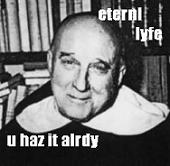
Suscipient autem regnum sancti Dei altissimi, et obtinebunt regnum usque in saeculum, et saeculum saeculorum. (Daniel 7:18)
What happened on Christmas Day 800?
By the Edict of Thessalonica in 380 the Catholic Faith became the religion of the Roman Empire. The Pontifex Damasus, the Bishop of Rome, as the head of the College of Bishops, thereby became the highest ranking magistrate of the Republic and from 445 everything sanctioned by the authority of the Apostolic See became law.
On 19 August 797 the Empress Irene deposed and inadvertently murdered her son Constantine VI and attempted to rule as Roman Emperor in her own right. Roman Law does not permit women to hold office. It was considered therefore by many that the imperial office was occupied but vacant. As a result it was thought that the restrainer of 2 Thessalonians 2:7 was absent.
According to St Jerome’s Chronicon, widely read in the west in the eighth century (which ironically diverges from his later Vulgate translation of Scripture), the creation of the world occurred in 5201 BC. This would mean that the tradition mentioned by St Irenaeus and Lactantius that the Antichrist would appear in the six thousandth year after the creation seemed about to be fulfilled. In the eighth century new year’s day was 25th December. The year 6000 AM would therefore begin on Christmas Day 800 by our reckoning.
In 799 this crisis reached fever pitch after the relatives of Adrian I attempted to mutilate and depose Pope Leo III. The pope escaped and fled to King Charles of the Franks and sought his aid in restoring the City of Rome to his control. It seems that, at this point, it was agreed that Charles would be constituted as Roman Emperor. After Charles restored Leo III in Rome, a council of Roman ecclesiastical and lay notables was held at which Leo III purged himself by oath of the various charges made by his enemies to justify his attempted deposition and Charles accepted a request that he adopt the title of Roman Emperor.
On Christmas Day 800 Charles attended Mass in St Peter’s Basilica. After the singing of the Gospel Leo III proclaimed over the kneeling Charles the formula of imperial acclamation and, as the people repeated his words, imposed the diadem upon him. Einhard tells us that Charles was very angry about the events of 25th December 800. Certainly, he never returned to Rome and he attempted to constitute his son Louis emperor directly without papal involvement.
So what happened? The Roman People anywhere have the right to acclaim someone Emperor if the position is vacant either through death or because the occupant has lost office though tyranny. This needs to be ratified by the Senate. The ceremony of acclamation in Constantinople incorporated senators, soldiers and civilians. Since the reign of Leo I (457-474) it was assumed that the procedure would conclude with a coronation but whether this was required for legitimacy was unclear.
Charles was acclaimed by ‘the Roman People’ and by individuals who might be taken as equivalent to senators in the City of Rome had such a body still met (it ceased to do so sometime around 600). There had been no elections for the offices which conferred senatorial rank since 14 AD. Imperial appointment to those offices (legalised by the Lex de imperio which became the process of acclamation) since that year had constituted someone as a senator. The pope, of course, was elected. As Pontiff presumably he was of the highest senatorial rank. Did he alone supply for the office of the Senate or were his own clerical electors now the western Senate? Since 750 the region around Rome had ceased to answer even theoretically to the government in Constantinople, but did that make the people there non-Romans? Were the people who acclaimed Charles Romans because they lived in Rome or because they were Catholics (as Gregory of Tours observed “Romanos enim vocitant nostrae homines religionis”)? If the latter, can any multitude of Catholics (identified by the tria vincula) perform the popular half of the task of constituting the princeps?
Setting these questions aside, however, the initiative on the morning of 25th December 800 was taken by Leo III. He first spoke the words of acclamation and performed the act which in Constantinople would merely bless and consecrate the individual already constituted as emperor hours earlier. Leo III’s actions would be taken in later years as indicating that the pope had made Charles emperor. It seems from Charles’s own actions between 800 and 814 that he was concerned that that was indeed what they implied. Where then did the Senate and the People come in? Either they played their part in the council a few days earlier in which case their role might be taken as necessary but insufficient (with the pope’s action completing the required elements) or they merely recognised an act entirely accomplished by the pope or the pope and the people both accomplished it simultaneously with the pope acting as sole senator or the clergy acting as the Roman Senate.
What then was the ‘Holy Roman Empire’ from 962 to 1806? It does not seem that the pope or the emperor or anyone else constituted the Kingdom of the Franks or the eastern portion of the Kingdom of the Franks as the Roman Republic. Neither Franks nor Germans ever claimed to be ‘Romans’ in any sense distinct or superior to the claims of all Catholics, the subjects of the Emperor in Constantinople or the inhabitants of Rome. The convention of treating the Rex Teutonicorum as the nominee for papal coronation as Emperor (and from 1508 Imperator electus) can be no more than that, a convention of the popes. Neither the regnum Teutonicorum nor the aggregate of the Kingdoms of Germany, Italy, Burgundy and Bohemia were ever the Roman Republic or the Roman Empire (except per accidens as the territory over which the nominee for the imperial title happened to rule). The popular functions in the imperial election were fulfilled either by the congregation at the papal coronation (and therefore might have been fulfilled by any gathering of Catholic laymen anywhere) or by the electors of the Rex Teutonicorum by the double title of simply being baptised Catholics and the convention that the pope considered the Rex Teutonicorum the nominee for coronation as Emperor.
Had the ruler of Constantinople at any time from 800 to 1439 presented himself for papal coronation would he already have been Imperator electus? Surely the answer is yes. In fact, from 6th July 1439 he was recognised by the Holy See and the Church herself via the definition of an Ecumencial Council as βασιλεύς Ῥωμαίων without papal coronation. Thus, the Roman Republic in the east retained the right to constitute a Roman Emperor, a right which no western state ever acquired.
Who then are the Populus Romanus today? Who is competent to constitute the Roman Emperor? Any multitude of Catholics (identified by the tria vincula) may perform the popular portion of the constitutive act. The pope alone may complete this act and constitute the candidate as Emperor. An actual commonwealth could only become the Roman Republic and acquire the right to constitute its ruler as Emperor, only if, after it’s ruler had received the imperial dignity at the hands of the pope, its people, possessing the sovereign power in a temporal commonwealth, willingly extended the rights of citizenship to all Catholics (identified by the tria vincula) resident within their borders. That this right does not arise merely from unbroken possession of the Roman civic institutions is demonstrated by the fact that those institutions were defunct between 1204 and 1261 and the right to constitute a Roman Emperor was still recognised in 1439 as inherent in the polity reconstituted in 1261.
What rights are conferred on a ruler by the Roman title? The Roman Emperor has primacy of honour over all other Christian temporal rulers and the right to extend his sovereignty over any pagan territory subdued in a just war without further papal grant.
“O Almighty and Eternal God, in Whose hands are the powers of all men and the rights of all Kingdoms; graciously look down upon the Roman Empire, that the nations that confide in their fierceness may be repressed by the power of Thy right hand. Through Our Lord. R. Amen.”
This is, in fact, no small privilege in a world in which almost every state is a tyranny and therefore open to overthrow by any legitimate power of sufficient magnitude. The faithful continue to constitute the Populus Romanus and were they able to constitute the Respublica in the temporal order their rights of conquest would be extensive. The damage inflicted by the culture of death on each nation and on the community of nations is undoubtedly lasting, grave, and certain. Wherever there is a serious prospect of success and the use of arms would not produce evils and disorders graver than the evil to be eliminated what could stand against the triumphant Labarum of the Republic founded and ruled by Christ?








